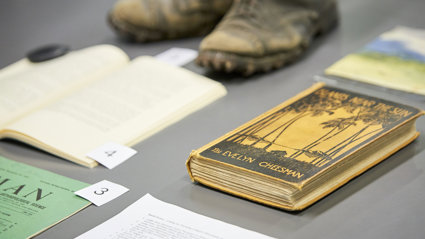
Terra incognita
Women on Royal Geographical Society-supported Expeditions, 1913-1970.
Research by Sarah L. Evans.
September 2010 start, 2015 completion. University of the West of England: PI Dr Avril Maddrell.
Overview
Sarah's project considered women's participation in Royal Geographical Society supported expeditions between 1913 and 1970, focusing on the unique expedition archives of the Society
Women’s expeditionary work, in common with women’s geographical work more broadly, has been comparatively understudied within the history of geographical thought and practice, and within the wider discipline, until relatively recently.
The project charts this terra incognita, and presents a reconstructed historical geography of women’s participation in Society-supported expeditions between 1913 and 1970, taking as its start date the permanent admission of women to the Fellowship of the Society.
Building on earlier substantive feminist research into women’s historic geographical and expeditionary work, it presents a systematic survey of all applications for Society support during this period, drawing on a range of sources from across the Society archives and Collections.
Drawing on these original findings, and on the extensive literatures around feminist historical geography, feminist epistemologies, the historiography of geographical thought and practice, as well as the recent literature on mobilities, this thesis investigates how women negotiated the networks in, around, and beyond the Society to gain support for their expeditionary work. In particular, it highlights the importance of women-focused networks and familial-social networks for gaining this support.
It also uses their participation in and embodied experiences of Society-supported expeditions, including their expeditionary (im)mobilities and expeditionary relationships, to complicate existing understandings of expeditions as a male-dominated space, form, and practice of geographical knowledge production, thereby investigating the relationships between gender, subjectivity, and expeditionary knowledge production.
Finally, it considers the dissemination and reception of their expeditionary knowledges within the spaces of the Society.
Find out more
A printed copy of this thesis is available for consultation in the Foyle Reading Room (reference only). An electronic copy can be accessed through the University of the West of England's Research Repository.
You can view some of the data that underpins this project on OSF.
Selected publications from Sarah's project
- Evans, S.L., 2017, ‘Lost histories: why films are failing the past’, Geographical Magazine. 89:5 (May 2017 print edition and online).
- Evans, S.L., 2017, ‘Women explorers’. In The International Encyclopedia of Geography. Edited by Douglas Richardson, Noel Castree, Michael F. Goodchild, Audrey Kobayashi, Weidong Liu, and Richard A. Marston. (John Wiley & Sons, 2017). DOI: 10.1002/9781118786352.wbieg1019.
- Evans, S.L., 2016, ‘Mapping Terra Incognita: Women’s Participation in Royal Geographical Society-Supported Expeditions 1913-1939’, Historical Geography. 44, pp. 30-44.
- Evans, S.L., Keighren, I.M. and Maddrell, A., 2013, ‘Coming of age? Reflections on the centenary of women’s admission to the Royal Geographical Society’, The Geographical Journal. 179:4, pp. 373-376.
- Evans, S.L., 2013, ‘Between terra incognita and home: a collaborative expedition through the RGS-IBG archives’. In Innes M. Keighren, Ruth Craggs and Hilary Geoghegan, eds., Collaborative geographies: the politics, practicalities and promise of working together, Historical Geography Research Series, no. 43.